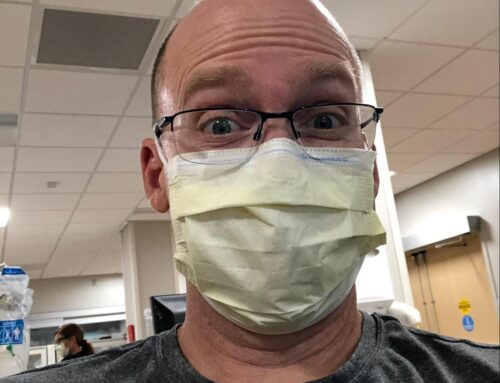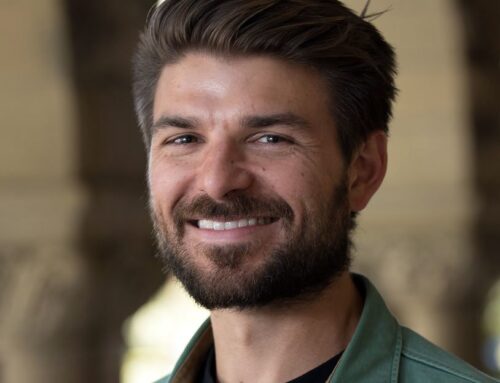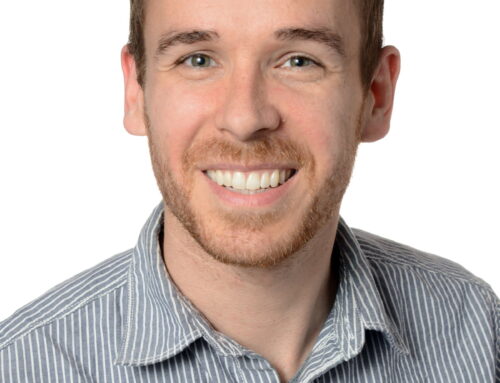Dr. Julianna Jung is Associate Professor of Emergency Medicine and Director of Undergraduate Medical Education at Johns Hopkins University. She shares an important story about a challenging case, and how its changed her outlook to be more compassionate for ourselves, colleagues, and patients. Carving out time to remain active, outdoors, and engaged in her outside interests are part of her formula for maintaining wellness. Learn more about how she stays healthy in EM!

- Name: Julianna Jung, MD, MEd, FACEP
- Location: Johns Hopkins University School of Medicine
- Current job(s): Associate Professor of Emergency Medicine, Director of Undergraduate Medical Education
- 1 word that describes how you stay healthy: Compassion
- Primary behavior/activity to help de-stress: Closing my laptop!
What are the top 3 ways you keep healthy?
My primary technique for staying healthy is by treating myself with compassion. I set clear and reasonable limits on my work hours and goals, and give myself permission to adhere to them – even when that means that some tasks remain incomplete. I do my best to forgive myself when I can’t accomplish everything that I’d like. I’ve learned to congratulate myself on what I do achieve, rather than flogging myself for my failures.
What is your ideal workout?
I really like to be outdoors – cycling, running, hiking, or just walking the dog. I exercise outside all year long, and especially enjoy winter walks. I firmly believe that there is no bad weather – only bad clothing choices! Most of my strength training consists of brief and focused workouts that I can do at home – yoga, FitStar, and BodyBoss when I’m feeling Spartan.
Do you track your fitness? How?
I wear a Fitbit and aim for 10K steps per day. I also log workouts and diet using a fitness app.
How do you prepare for a night shift? How do you recover from one?
I honestly haven’t really gotten this down. I often just “power through,” as I’m not a good daytime sleeper and my kids are likely to wake me up anyway. Recovery is easier – SLEEP! When I’m between nights, I allow myself to sleep as long as my body wants. At the end of a night block, I try to haul myself out of bed by 1pm so that I’ll be tired enough to go back to bed at a reasonable hour.
How do you avoid getting “hangry” (angry due to hunger) on shift?
I’m a huge believer in always having a plan. My residents tease me about my snack bag. I bring a shopping bag full of cut fruits or veggies, yogurt, hummus, nutrition bars, etc. That way I don’t freak out and raid the graham cracker drawer during the 7th hour of my shift, or go home and eat a pint of ice cream.
How do you ensure you are mentally in check?
I make a conscious effort to approach all people and situations with positive regard. I try to begin with the assumption that people are fundamentally reasonable, and have honorable motives for what they do and say. When I have negative feelings about a patient, trainee, or consultant, I try to reflect in the moment. I ask myself “why would a reasonable person do this?” Usually the issue is just a difference in perspective or experience, and communication can bring us together. Going through this process usually keeps me from getting angry, and allows me to reach a productive solution to the conflict.
I also think it’s really important to be open with colleagues and loved ones about the emotional aspects of our work, and to seek help when we need it. There is a culture of bravado in EM, and a perception that we’re not supposed to have feelings about our patients and our work. I had one of the most traumatic experiences of my career about a year ago. A young woman died tragically under my care, and I felt personally responsible. Despite my best efforts, I completely broke down in the ED. I was mortified with myself, feeling that I had been completely unprofessional.
That evening, one of the nurses posted some comforting words on my Facebook wall. Soon after, there were over a hundred responses from nurses, techs, and doctors I’d worked with throughout my career, many sharing their own tragic experiences. This outpouring of support and encouragement really pulled me out of my darkest hour. It made me realize that suffering in silence only worsens the doubt and pain that is inevitable in our profession. Now I’m much more cognizant of my need to reach out to my support network when I’m hurting, and to proactively check in with my colleagues when I suspect they need it.
What are the biggest challenges you face in maintaining a longstanding career in EM? How do you address these challenges?
In truth, I don’t feel very challenged in this regard. Nights are getting harder as I get older, but otherwise I really enjoy my job. I think that the key for me is balance – I have sought out teaching and research opportunities to support part of my salary, so I have a nice mix of teaching, academic, and clinical time.
Best advice you have received for maintaining health?
Carve out time for myself, and don’t let work encroach on that time. It’s important for me to have time with my family and friends, to stay physically active, and to pursue my creative hobbies (I cook, sew, knit, and dabble in art and photography). Without making that time for myself, I would certainly lose my mind!
Who would you love for us to track down to answer these questions?
Sharon Bord
Kathy Hiller




